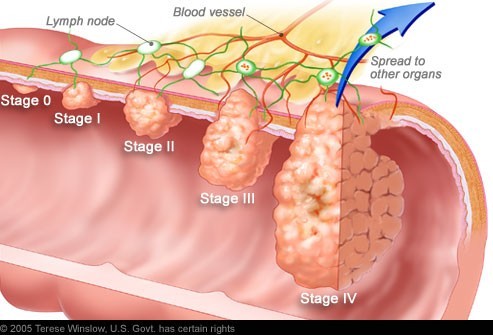
Diagnosed with Cancer? Your two greatest challenges are understanding cancer and understanding possible side effects from chemo and radiation. Knowledge is Power!
Learn about conventional, complementary, and integrative therapies.
Dealing with treatment side effects? Learn about evidence-based therapies to alleviate your symptoms.
Click the orange button to the right to learn more.
Watch and Wait in Rectal Cancer

Watch and wait in rectal cancer is finally here. I say finally because “deintensifying treatment” has come to many other forms of cancer including prostate cancer. Years ago.
Let me be clear up front. Watch and wait is for locally advanced rectal cancer. Early stage cancers only are eligible for a watch and wait treatment plan.
“Watch and wait” is somewhat of a misnomer in my experience. While the patient may want to wait before undergoing any conventional therapies, they should “pre-habilitate” with evidence-based non-conventional therapies including:
- Anti-angiogenic nutrition
- Anti-angiogenic supplementation
- Lifestyle therapies such as exercise.
According to research, prehabilitation before any/all cancer therapies will enhance your response to therapy if you ever do progress. Prehabiitation is tailor-made for watch and wait for rectal cancer.
I was diagnosed with a pre-cancer stage of cancer. My cancer, multiple myeloma, is different than rectal cancer. My point is that my oncologist told me that there was nothing that I could do. I now know that my onc. was wrong.
While I probably would have progressed to full myeloma, I would have responded to therapy better when I underwent induction therapy and may have avoided many of the side effects that I now live with.
Have you been diagnosed with locally advanced rectal cancer? If you would like to learn more about taking a watch and wait therapy plan, email me at David.PeopleBeatingCancer@gmail.com
Thank you,
David Emerson
- Cancer Survivor
- Cancer Coach
- Director PeopleBeatingCancer
Watchful Waiting: A Modern Approach to Rectal Cancer
“New and evolving research in locally advanced rectal cancer suggests that selective use of treatments in some patients can achieve outcomes similar to those of standard regimens…
Total neoadjuvant therapy (TNT) is the standard treatment that involves systemic chemotherapy and radiation therapy before surgery for patients with locally advanced rectal cancer…
However, recent clinical trials support several strategies for “deintensification” of TNT for patients with locally advanced rectal cancer, he said..
.“Some patients may not require surgery or radiation therapy, or they may not require any treatment modalities including radiation therapy, chemotherapy, and surgery”
Does Watch and Wait Work?
Selective surgical omission, also known as a “watch and wait” or nonoperative management (NOM), involves treating patients with chemotherapy or a combination of chemo and radiation therapy but without surgery, Dr Willett said during his presentation at the meeting.
Data from the OPRA trial published in the Journal of Clinical Oncology showed that 36% of patients who started on NOM developed tumor regrowth, most of which occurred in the first 2-3 years. Five-year disease-free survival rates were similar in patients who had total mesorectal excision (TME) upfront and those who had salvage TME procedures after tumor regrowth (61% and 62%, respectively). An update to the OPRA trial showed that the clinical outcomes persisted, and the results suggest no significant differences in disease-free survival between upfront surgery vs. watch and wait, Dr Willett said…
Does Selective Omission of Radiotherapy Work?
Selective omission of radiotherapy is another option for reducing the overall treatment burden in patients with locally advanced rectal cancer, Dr Willett. For these patients, who are at relatively low risk for recurrence, radiation along with surgery may not be needed…
What Are the Takeaways for Deintensifying Treatment of Rectal Cancer?
The global continuum of rectal cancer clinical trials has provided significant evidence that, for select patients, the deintensification of treatment strategies may result in the avoidance of radiation and even avoidance of surgery, which can profoundly improve long-term quality of life…
“A critical takeaway message for clinicians who are determining which individual patient might benefit from a less intensive regimen to treat locally advanced rectal cancer is to first have a multidisciplinary consensus which should encompass review of a rectal MRI, pathology, chest and abdominal imaging, colonoscopy, as well as the patient’s clinical status including comorbidities…”
“The location of the rectal tumor (distal versus proximal) and clinical TNM stage also will inform the discussion as to which of the potential total neoadjuvant therapy regimens would be most optimal to reduce the risk of local recurrence and maintain long-term quality of life for the individual patient…”
The effectiveness of less intense treatment for rectal cancer remains a work in progress, Dr Benson said in an interview. “There is much we still do not know, such as the optimal selection of patients and the durability of this approach over time.”
Patients who undergo watch and wait require intensive follow-up, including sigmoidoscopy, digital rectal exam, and rectal MRI, to detect any evidence of local recurrence that would warrant further intervention, including possible radiation and surgery, he said. A highly skilled multidisciplinary team is a must for individuals who are potential candidates for a less intense treatment regimen, he emphasized.
The treatment of locally advanced rectal cancer continues to evolve, but there is no question that TNT has transformed patient outcomes, including the ability to deintensify treatment for select patients, Dr Benson said.”

